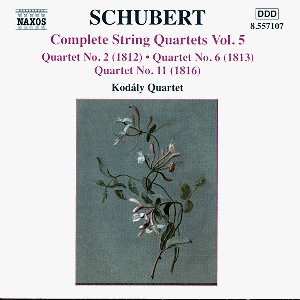Comparison recordings: Melos Quartet Various
DG CDs
It seems Iíve always owned a full set of the
Schubert Quartets and it has always been a favorite set of mine.
They go as well heard all together as they do one at a timeóexcept
with the last three, of course, of which any one is a whole dayís
work.
Here we have the usual situation where someone
draws a salary just to decide which quartets to put on each CD,
rather than the easier and more useful course of just starting
at the beginning, continuing to the middle, and proceeding on
to the end. But this is the age of doing everything in as complicated
a manner as possible.
I cannot imagine better performances of these
works. Of course, thereís almost no such thing as a second
rate string quartet*, since the work is so hard, the qualifications
so demanding, and the rewards so slight that nobody would do it
if they didnĎt love it, and had an independent source of
income. Itís no accident that most successful quartets are made
up of tenured and/or retired professors from famous music schools,
as here.
These players know their Haydn, Mozart, and Beethoven,
as Schubert did. They are alert to Schubertís quirky sense of
adventure, the smouldering darkness in his music, and are ready
to run off and explore a whole new world without dropping a phrase
when Schubert asks them to. And, they receive excellent recording.
You could spend more money but you couldnít get any more music.
If the rest of the set is this good, and you donít already have
the music, itís a sure good buy. Compared to the Melos group,
the Kodalys are a little more rhapsodic, melodic, and sensual,
whereas the Melos group, as befits a quartet from Stuttgart, are
more architectural and precise. But Schubert should certainly
be heard both ways, at least both of these ways and other
ways as well.
*There are a few, and of course anybody can have
a bad day, so Iíll not name any names.
Paul Shoemaker
